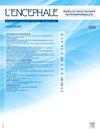Constipation in hospitalized psychiatric patients: An underestimated common phenomenon. Retrospective epidemiological study in an adult psychiatric hospital setting
IF 1.2
4区 医学
Q4 NEUROSCIENCES
Encephale-Revue De Psychiatrie Clinique Biologique et Therapeutique
Pub Date : 2024-02-03
DOI:10.1016/j.encep.2023.11.006
引用次数: 0
Abstract
Objective
Constipation is more common in patients with mental disorders than in the general population. However, its frequency in hospitalized patients, its association with drugs and how teams become aware of it and take care of it are not fully identified.
Method
The retrospective study included 141 male and 127 female new patients admitted for routine treatment at France's largest psychiatric hospital between November 15 and December 11, 2017. A physician reviewed electronic medical records to diagnose constipation and record variables of interest: socio-demographic factors, diagnosis, drugs prescribed and taken. We calculated an anticholinergic impregnation score (AIS) for each patient by using a validated French scale. Patients were then classified into two groups by state of constipation defined by the physician. Univariate and multivariate analyses were used to study the frequency of constipation, factors associated with it and its management.
Results
The prevalence of constipation was 38% (95% CI 32–44). Associated factors were taking antipsychotics and the burden of anticholinergic treatment. On multiple regression analysis, the only remaining factor was anticholinergic treatment: AIS ≥ 5 was associated with constipation (odds ratio 1.80 [95% CI 1.07–3.14], P = 0.027). Only 44.0% of patients were prescribed a preventive laxative, systematically in half of the cases. Above all, only 11.2% were administered this laxative (i.e., 25% of that prescribed). Digestive transit was poorly recorded in the table of constants (34.7%). We found one case of sub-occlusion as a severe case.
Conclusion
Constipation is common in psychiatric inpatients. The more the patient is prescribed drugs with a pronounced anticholinergic effect, the greater the risk. Alongside the preventive measures common to all psychiatric patients which must be promoted (concerning diet, physical activity, etc.), polymedication with this type of anticholinergic must be better monitored to prevent complications: prescription and administration of a preventive laxative, monitoring transit in the table of constants. Thus, a better knowledge of the subject and specific training are essential.
住院精神病人的便秘:一种被低估的常见现象。一项在成人精神病院环境中进行的回顾性流行病学研究。
目的:精神障碍患者便秘的发生率高于普通人群。然而,其在住院患者中的发生频率、与药物的关联性以及团队如何意识到便秘并采取护理措施等问题尚未完全查明:这项回顾性研究纳入了2017年11月15日至12月11日期间在法国最大的精神病医院接受常规治疗的141名男性和127名女性新入院患者。医生查看电子病历,诊断便秘并记录相关变量:社会人口因素、诊断、处方和服用药物。我们使用经过验证的法国量表计算出每位患者的抗胆碱能浸渍评分(AIS)。然后根据医生定义的便秘状态将患者分为两组。采用单变量和多变量分析研究便秘的发生频率、相关因素及其处理方法:结果:便秘发生率为 38%(95% CI 32-44)。相关因素包括服用抗精神病药物和抗胆碱能药物治疗的负担。在多元回归分析中,唯一剩下的因素是抗胆碱能治疗:AIS≥5与便秘有关(几率比1.80 [95% CI 1.07-3.14],P=0.027)。只有 44.0% 的患者得到了预防性泻药的处方,其中半数是系统性的。此外,只有 11.2% 的患者服用了这种泻药(即处方量的 25%)。常量表中对消化道转运的记录较少(34.7%)。我们发现了一例严重的亚闭塞病例:结论:便秘在精神病住院患者中很常见。结论:便秘在精神病患者中很常见,患者服用的抗胆碱能药物越多,便秘的风险就越大。除了所有精神病患者都必须采取的预防措施(有关饮食、体育锻炼等)外,还必须更好地监测使用这类抗胆碱能药物的多重治疗情况,以防止并发症的发生:处方和使用预防性泻药,监测常量表中的转运情况。因此,加强对这一主题的了解和专门培训至关重要。
本文章由计算机程序翻译,如有差异,请以英文原文为准。
求助全文
约1分钟内获得全文
求助全文
来源期刊
CiteScore
4.60
自引率
7.40%
发文量
162
审稿时长
6-12 weeks
期刊介绍:
Une revue française de renommée internationale.
- Un comite de rédaction représentant tous les aspects de la prise en charge psychiatrique du patient.
- Une sélection rigoureuse d''articles faisant l''objet de plusieurs expertises.
- Des travaux d''auteurs et de chercheurs de renommée internationale.
- Des indexations dans les grandes bases de données (Current Contents, Excerpta Medica, etc.).
- Un facteur d''impact qui témoigne de la grande notoriété de la revue.
La tribune des publications originales de haut niveau.
- Une très grande diversité des sujets traités, rigoureusement sélectionnés à travers des sommaires dynamiques :
- des éditoriaux de médecins référents,
- une revue de presse sur les actualités internationales,
- des articles originaux pour approfondir vos connaissances,
- des mises au point et des cas cliniques pour engager votre réflexion sur les indications et choix possibles au travers de mises en situation clinique,
- des dossiers thématiques pour faire le tour d''une question.
- L''actualité de l''AFPB : L''Encéphale publie régulièrement des comptes rendus de l''Association française de psychiatrie clinique.

 求助内容:
求助内容: 应助结果提醒方式:
应助结果提醒方式:


